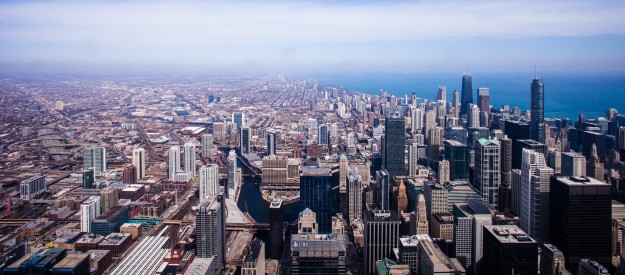"We are losing our attitude of wonder, of contemplation, of listening to creation and thus we no longer manage to interpret within it what Benedict XVI calls 'the rhythm of the love-story between God and man.'"
+ Pope Francis
Loyola University Chicago hosts bold, school-wide chat about Laudato Si'

As the world continues to absorb Pope Francis’s Laudato Si’—and as we in the States prepare for a visit by the Holy Father later this month—one American university is already fulfilling the pope’s great wish: dialoguing as a community about living justly and sustainably in our brave new world of the third millennium.
Loyola University Chicago’s "Caring for Our Common Home: Conversations on Ecology and Justice" has been in the works since March, according to Michael Murphy, PhD, director of the school’s Catholic Studies Program. Asked about the magnitude of the wide-ranging "symposium/town hall/teach-in," Murphy told Catholic Ecology that the gathering is not some reformulation of an annual conference. Rather “it’s a stand-alone, university-wide discussion. It’s that important.”
He added that the event, held on September 9th, is “part academic and part a conversation” about “how do we as Catholics feel about Laudato Si’? And how do we respond?”
What makes it more notable is the heavy student involvement that went into its planning and that’s going into its execution. Murphy said that both graduate and undergraduate students, working together, have been and remain part of the process.
“They’re a superb group,” he said.
This sort of school-wide engagement of Laudato Si’ seems a natural at the Jesuit-run Loyola, which has come in the top five of the Sierra Club’s “green campus” rankings. Murphy admits that while like all colleges and universities not every student prioritizes environmental protection, those that do (and there are many) are deeply committed.
This is why the university is able to host an eco-event without requiring student attendance to academic talks or by offering class points if they just show up.
As for measuring the success of the day, Murphy says that will depend on how deeply the themes of Laudato Si' enter into student conversations in the months and years ahead and how they enter future syllabi of the faculty.
According to the school’s advance publicity, the morning session will feature six academic responses on a number of subject areas, including “The Human Roots of the Ecological Crisis” and “Ecological Education and Spirituality.” The event will cumulate outdoors with a teach-in, a time for academic and community dialogue, featuring breakout groups and a series of student- and faculty-led artistic performances and spoken word reflective of the issues discussed throughout the day.
During the afternoon, the University will host two town halls, with one serving as an intercampus and interdisciplinary open conversation about the Pope’s encyclical. A second session will focus on plans for “renewed integration of the teaching, research, and engagement on climate science and adaptation” that will help the University achieve its goal to reduce its carbon emissions over the next 10 years.
Following the presentation, an open discussion will be held on the topic.
And there’s a fitting place to end: with discussion. That is, indeed, the great call of Pope Francis in Laudato Si’:
“I urgently appeal, then, for a new dialogue about how we are shaping the future of our planet. We need a conversation which includes everyone, since the environmental challenge we are undergoing, and its human roots, concern and affect us all.” (Laudato Si’ 14)
May God bless Dr. Murphy and all those at Loyola who will be presenting, conversing, and finding new ways to come together and care for our common home.
For more on Laudato Si' at Loyola University Chicago, check out this brief (5-minute) video snapshot:


















